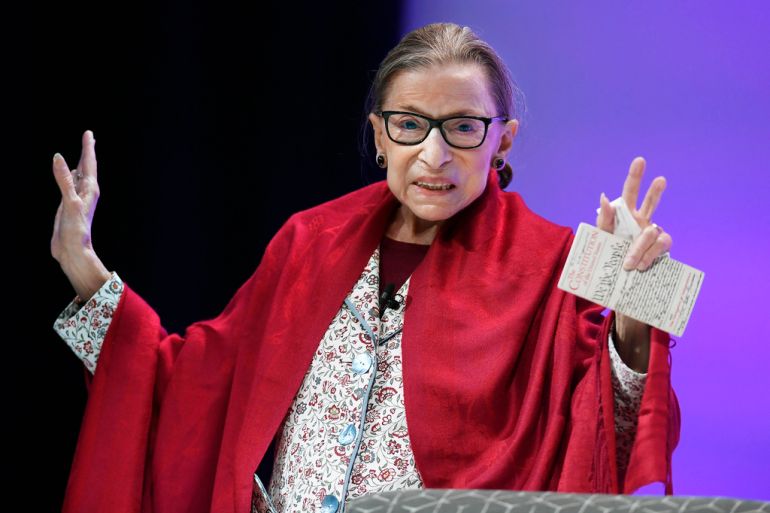US Supreme Court honours former justice Ruth Bader Ginsburg
Following women’s rights champion Ginsburg’s death in 2020, the US Supreme Court saw its conservative majority expand further.

A tribute to the late United States Supreme Court Justice Ruth Bader Ginsburg was held on Friday to honour her life and work as a champion for women’s rights.
Colleagues and law clerks — young lawyers who work with justices for the span of a year — remembered Ginsburg’s accomplishments in a rare meeting of the Supreme Court Bar, an organisation of lawyers who have practised before the court.
Keep reading
list of 3 itemsFive ways the US Supreme Court reshaped policy in 2022
Roe v Wade: Supreme Court decision highlights US abortion divide
Featured speakers included Elizabeth Prelogar, the 48th US solicitor general and the fourth-ranking figure in the Department of Justice. Though she now represents the federal government before the Supreme Court, Prelogar had formerly served as a clerk for Ginsburg.
“Justice Ginsburg’s accomplishments as an advocate are extraordinary, the stuff of legend,” Prelogar told the audience, referencing Ginsburg’s tenure before joining the court.
Ginsburg served as a justice for 27 years. She was only the second woman to join the bench on the nation’s highest court.
But she had previously argued as a lawyer before the Supreme Court for many years, famously pushing to protect women’s rights. She won five of the six cases she presented before the court in the 1970s and was ultimately appointed as a justice in 1993 by then-President Bill Clinton.
“Although Justice Ginsburg’s advocacy transformed an entire area of constitutional law, she never focused only on abstract legal principles. Decades later, she still remembered every client and the injustices that brought them to court,” Prelogar said on Friday, praising her mentor’s “enduring commitment” to everyday Americans.
But Ginsburg’s death ahead of the 2020 election would prove to be a transformative moment for the Supreme Court, allowing its nine-member bench to lean even more conservative.
Ginsburg died on September 18 of that year, allowing then-Republican President Donald Trump to fill her seat with Justice Amy Coney Barrett, his third appointment to the bench.
That gave conservatives a commanding six-to-three majority over the Supreme Court. The court has since backed several conservative priorities, including the repeal of Roe v Wade in June 2022, which ended the constitutional right to abortion.
Ginsburg supported the right to abortion access, though she was, at times, critical of the precedent set in the 1973 Roe decision.
The late justice’s legal battles and seniority on the court ultimately transformed her into a pop culture icon toward the end of her life. Her life was chronicled in the 2018 documentary RBG, and she was popularly called the “Notorious RBG“, a play on a rapper’s name.
Ginsburg famously collected lace and beaded collars to wear over her black Supreme Court robes, items that inspired their own fan appreciation.
“Her life was a quintessentially American story,” Prelogar said on Friday. “She was born to a family of immigrants and grew up with modest means. She faced profound adversity and discrimination. Yet, through her intellect, hard work and force of will, she not only reached the top of her profession, she reshaped it.”
Ginsburg’s battle with cancer began six years into her Supreme Court tenure, when she had surgery for colon cancer. Over the years, she also underwent treatment for pancreatic cancer, complications from which would ultimately claim her life.
The summer before she passed away at age 87, she confirmed her commitment to staying on the bench.
“I have often said I would remain a member of the court as long as I can do the job full steam,” she said in a statement. “I remain fully able to do that.”
Ginsburg is buried at Arlington National Cemetery in Virginia, not far from the nation’s capital. She was the first woman to live in state at the US Capitol after her death.
Friday’s ceremony in her honour was part of a longstanding tradition at the Supreme Court Bar, dating back to 1822. The last justice to be remembered with such a ceremony was the late Antonin Scalia, a conservative figure who bonded with Ginsburg over a shared love of opera.